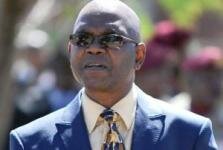STELLENBOSCH, South Africa Students at South Africa’s Stellenbosch University are threatening to go beyond protest marches and seek a legal right to be taught in English rather than Afrikaans, the language they identify with apartheid.
Tensions at the campus, where professor Hendrik Verwoerd helped to define the racial ideology that he later turned into national policy, rose with the latest allegations of white privilege shaping South Africa’s rugby team.
Now students at Stellenbosch, north of Cape Town in prime vineyard country, are challenging the use in some courses of Afrikaans, a language born of Dutch settlement in South Africa in the 17th century.
Long identified with the racial classification which sought to split the black majority and forcibly remove people to ‘tribal homelands’, far from major cities and natural resources, Afrikaans is one of 11 official languages in South Africa.
Its dominance at Stellenbosch is seen as a stumbling block to academic success for those who don’t speak it at home, perpetuating inequality imposed on previous generations by restrictions on where people could live, work, go to school and own land.
Even those Afrikaans-speakers whom apartheid classified as Coloured, meaning mixed-race, support the fight for a choice.
“The majority of Coloured students at Stellenbosch university are Afrikaans-speaking and their preference is to be taught in Afrikaans,” Amy Meyer said, a Coloured student who regards her first language as English.
“However, there are many Coloured students who prefer to be taught in English and the fight is to be taught in a language of your preference and not have Afrikaans forced on you to achieve academic success,” Meyer said.Race in education remains an emotive issue. Under white minority rule, which ended in 1994, blacks were relegated to sub-standard government schools designed to prepare them for little more than unskilled, manual labour. Many from the black majority were sent to the impoverished ‘homelands’ whose total land area covered barely a tenth of South Africa.
Besides seeking a revamp of Stellenbosch’s academic curricula and the restoration of a centre that monitored and advised university managers on equal opportunity policy, student activists want to use English as an equaliser.
“The end goal is the reformation of institutional culture, but how we get there is in fact through changing the language policy so that no student is forced to learn in Afrikaans and that all classes must be available in English,” Mohammad Shabangu, spokesman for the Open Stellenbosch group said.
‘BORN FREES’
Stellenbosch has produced prominent anti-apartheid figures, such as theologian Beyers Naude and many students who resisted conscription to the army when it was being used to quell black protest in the 1980s.
In response to the latest protests, the university says it allows a multilingual approach where Afrikaans is used as an academic language, alongside English.
This does not satisfy student activists among the “Born Frees” – those born after 1994, with no direct experience of white-minority rule.
Students succeeded in getting a statue of Cecil John Rhodes, seen as a symbol of Britain’s colonial role in southern Africa, removed from the nearby University of Cape Town.
In Stellenbosch, the use of Afrikaans as medium of instruction in a country with 11 official languages has emerged as a rallying call for students, just as it did during the 1976 Soweto uprising, when police killed at least 69 students who were protesting against plans to teach them in Afrikaans.
In a documentary that went viral last month on YouTube, titled “Luister” or Listen, black students at Stellenbosch claimed they face racism, prompting the higher education minister and parliament to summon campus executives to the national parliament this week to explain how they will ensure equal opportunity.
Black, coloured and Asian students make up a third of the university’s population compared to a few individuals in 1990.
The university’s management said it does not tolerate any forms of discrimination, and rector Wim de Villiers added that a lecturer was fired after sending a student a racist message, while a student was suspended for making racial slurs.
“I must be clear,” he told Reuters of Afrikaans. “It is not being used or intended as a language of exclusion. We are intent and committed to increasing our demographic profile to at least 50-50,” he said of the ratio of white students to other groups.
But many black students, who speak Afrikaans as a third language after their mother tongue and English, say learning in Afrikaans has hurt their academic performance.
Those “who never had a background in Afrikaans, like many of the ’94 generation … really are at a disadvantage,” said Zoliswa Mbekwa.
Student activist Shabangu said: “Strategic litigation … is something we have to consider. The university will have to comply with the Constitution, which requires access for all South Africans, and if that means forcing the university, whether through the courts or parliament, then that needs to happen.”





